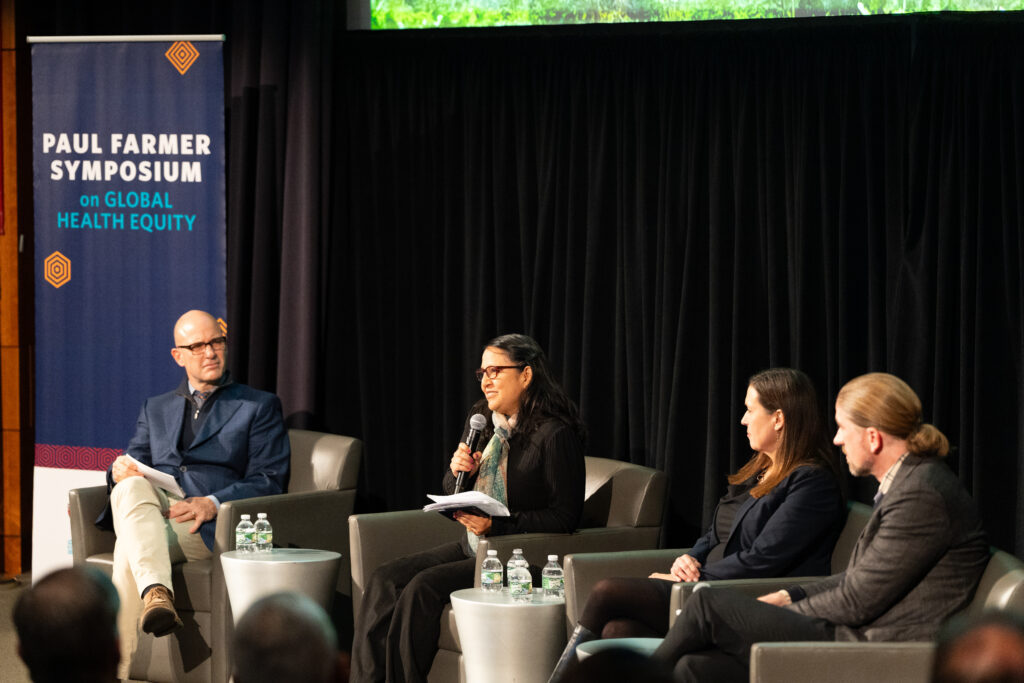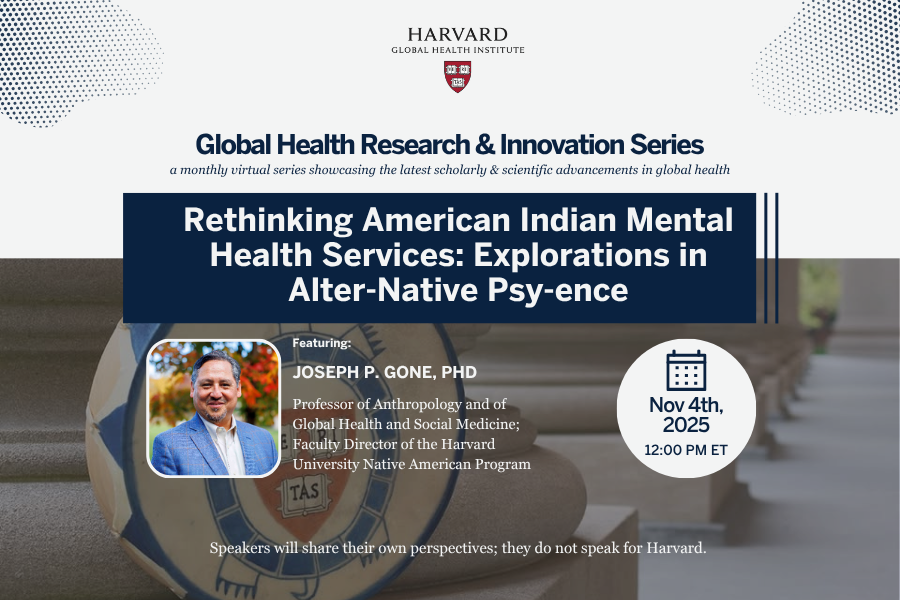Harvard T.H. Chan School of Public Health student, Davy Deng, interviews Dr. Arthur Kleinman, Professor of Medical Anthropology and Psychiatry, Harvard Medical School and Rabb Professor of Anthropology, Harvard University and Chair of the GlobalMentalHealth@Harvard Advisory Group.
Davy Deng:
You are known as one of the world’s leading experts on global mental health, particularly in East Asia. How did you first become interested in this topic?
Professor Kleinman:
I began my work in Taiwan in 1969, I was seconded there to the US Naval Medical Research Unit in Taipei because of the Vietnam War from the NIH. My responsibility was primarily to study infectious diseases and I was particularly interested in the stigma associated with Tuberculosis (TB) and leprosy. After spending a few years there, I realized that, as bad as the stigma of TB and leprosy was, comparatively, the level of mental health stigma was worse, so I became interested in this subject.
In 1978, after having done research on Taiwan’s healthcare system, I switched to mainland China where I began studying depression. I remember a conversation I had with the minister of health in China at the time. He adamantly told me that there are no such things as mental illnesses in China because it is a communist country, and that mental illnesses only existed in capitalist countries. I then became aware that there was a particular Chinese way of diagnosis for some of the depressive symptoms that people exhibited, called “neurasthenia” or literally in Chinese “nerve weakness”(神经衰弱). This was an obsolete medical term abandoned by the US at the time, but it was still widely used in China, so I decided to put my emphasis on introducing modern terms of diagnosis for mental illnesses to China and that began my decades of work on mental health in Chinese culture.
Davy Deng:
Since you began your work roughly 50 years ago, China has undergone a dramatic societal and economic transformation, how would you comment on the mental health care and mental health stigma in Chinese culture now?
Professor Kleinman:
There have been big changes in China’s mental health system. For example, mental health care has definitely become much more patient centric. In terms of mental health stigma, I would say it is still fairly high for chronic severe mental illnesses such as schizophrenia but not nearly as serious as it was in the past for depressive and anxiety disorders. This is particularly salient for generations that are under 40 years of age right now.
Another big change is the attitudes towards help-seeking behaviors. I’ve noticed that mental health problems in younger people exhibit more psychological distress and less somatic distress as seen in the older generations. This could be understood as the legitimation of a more affective idiom for youth, but surely it is also related to the fact that in the past a language of psychological distress and psychotherapies were seen as humiliating or simply western concepts that are not applicable to Chinese society. And now I would say there is a “therapy trend” (心理热) in China — people are very interested in counseling services and psychological treatments. Even for severe mental illnesses that require hospitalization, China’s mental hospitals are dramatically improved in quality from before. And health insurance for such care is increasingly available.
Lastly there is an emphasis on empowering the self and making changes in one’s life on one’s own, instead of relying on families, networks and institutions for decisions when it comes to mental health. This rise of individualism is not the same in my view as in the west because it is a more relational individualism.
Davy Deng:
China has traditionally been thought of as an example of a collectivistic society, do you think this brings challenges to eradicate mental health stigma?
Professor Kleinman:
I do not believe it is necessarily harder to eradicate stigma in Chinese culture. Chinese society is in fact both collectivistic and individualistic, and its society has undergone a turn toward individualism. If you look at Chinese society nowadays, you notice that the connections in Chinese culture are built around individuals and not families. What happens is that individuality is downplayed in cultural narratives and the interpersonal connections are emphasized. In contrast in the US, we emphasized the opposite and hyper-focus on individualism. And yet networks are very important in American society too. So in my opinion it would be a myth to call Chinese society only a collectivistic culture.
Davy Deng:
How would you comment on the mental health system in the US? What do you think is the main challenge here in the US?
Professor Kleinman:
The mental health system in the US definitely needs major reform. I am more optimistic about the mental health system in China than the one in the US. And I would argue that the mental health system in China is already equally good, if not better than that in the US. In my opinion, what’s happening is that in the US, we did a lot of research showing community-centered service can bring about positive outcomes for mental health patients by means of social re-integrations among other things. This led to deinstitutionalization. That in turn led politicians to argue for massive cuts in funding of mental health services, so that it is increasingly difficult to provide community mental health care in the US. Politicians did not use the money saved from de-institutionalization to build better mental health infrastructure for community services. The result is that lots of patients were discharged from mental health facilities but did not receive proper community services to help them recover, which contributed to a broken and chaotic system. That is what needs fixing.
Davy Deng:
What do you think of the progress we have made so far in global mental health?
Professor Kleinman:
Global mental health research has blossomed more than I expected with lots of excellent researchers, for example Vikram Patel, who are really moving the field forward. Just look at all the academic and media attention to mental health impact of the COVID-19 pandemic. If this were 20-30 years ago, there wouldn’t be a fraction of the attention to this issue. However, I think there is still a lot of work to be done. To begin with much more work needs to be done on improving the quality of care. Studies of community mental health workers are suggesting that this is an important way to move forward, especially in settings of poverty and marginality. But what we really require is amoral movement for mental illnesses such as the one that took place for HIV/AIDS in the late 1980s and early 1990s. Absent such a movement, ministers of finance are unlikely to greatly increase funding for mental health care to the level required that would greatly improve quality of services by increasing the numbers of mental health practitioners and the availability of mental health services in the community. And families will be left, as in the past, with the great burden of mental health problems and care, which they will have to continue to carry with inadequate resources. That is why I helped organize the World Bank’s project “Out of the Shadows” which addressed the financial needs of mental health care in societies.
Davy Deng obtained three bachelor’s degrees in psychology, chemistry and genetics from the University of California, Berkeley in 2019 and came to Harvard T.H Chan School of Public Health to pursue a S.M. in Biostatistics with an interdisciplinary concentration in population mental health. He is interested in topics related to humanitarian aids/human rights, political polarization, health equity and LGBTQ+ mental health. Additionally he has also been working on research with Dr. John Naslund in the Mental Health for All Lab at Harvard Medical School that investigates effective ways of designing digital peer support programs and the utilization of art therapy in re-socialization.
Professor Arthur Kleinman’s numerous publications have included works on social suffering, mental health, stigma, moral experience, and caregiving. Most recently, he co-edited a textbook on global health (Reimagining Global Health: An Introduction. 2013, UC Press), co-authored a book on moral life in China with his former students (Deep China. 2012, UC Press), and a book on humanitarianism in social sciences (A Passion for Society. 2016, UC Press). He is the author of What Really Matters: Living a Moral Life Amidst Uncertainty and Danger (OUP, 2006), Writing at the Margin: Discourse between Anthropology and Medicine (UC Press, 1995), and The Illness Narratives: Suffering. Healing and the Human Condition (Basic Books, 1988), amongst others. His new book is The Soul of Care: The Moral Education of a Husband and a Doctor (Penguin, 2019).
He is also the author of articles in The Lancet and New England Journal of Medicine on caregiving as moral experience; global mental health; values in health; reforming medical education via the medical humanities; the search for wisdom; and on culture, bereavement and psychiatry. He has co-authored articles on stigma and mental illness; on the appropriate uses of culture in clinical practice; and on medical anthropology. His current project is a collaborative study of social technologies for aging and eldercare in China. Kleinman is a member of the National Academy of Medicine and the American Academy of Arts and Sciences.





